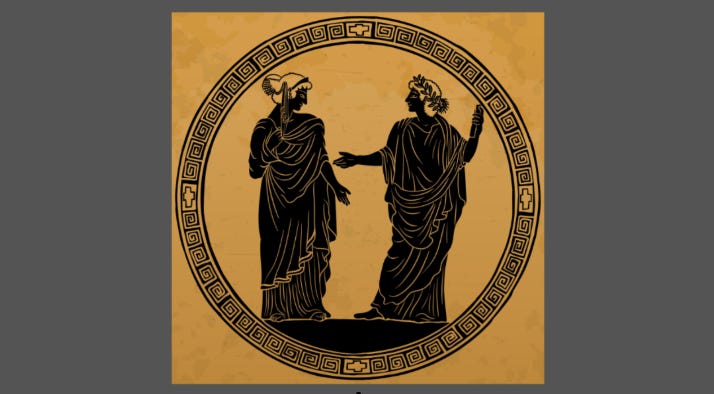The Liberal Arts: Curricula for Our Times
Part 2: "Civic Friendship" - by Cheryl Sadowski, MLA Alumna.
In this, the second of three essays on the value of Liberal Arts education, I explore the ancient concept of civic friendship and why it matters today. Some definition is needed.
But first, a story.
Aristotle’s swimming pool
My introduction to civic friendship did not occur at the end or even in the middle of my MLA coursework, but within the context of my first class on Aristotle and Thomas Hobbes taught by Professor Michael Harding. I had a meager background in Western philosophy, save high school civics and some political science in college. After negotiating down my anxiety over reading Nichomachean Ethics, it turns out my fears loomed larger than the readings themselves.
Still, there is no gingerly wading into the pool with Aristotle: He throws you delightfully into the deep end to splash about for a while before finding something to hold onto. It wasn’t long before our class engaged in lively discussions and debate. We advanced in hard-won, common understanding of a particular concept only to float (or sometimes dissolve) in the face of another. All of this intellectual churning was productively channeled by our professor, who ensured our propensity to draw inferences between past and present was well-grounded in proper interpretations and citations.
Political philosophy is rigorous, illuminating, and really quite exciting. What I didn’t grasp then is that I was actually participating in the ancient ideal of civic friendship by conversing with fellow classmates, girded by mutual goodwill and a genuine desire for understanding and accord, even when accord was unattainable. My classmates and I became friends, for a time, not of character but utility. We needed one another, our professor, and Aristotle’s ideas for everyone to benefit and for the class to succeed.
And therein lies the beauty of civic friendship: it isn’t as much a noun as a verb, not an endpoint but a process. Civic friendship is when pluralism meets polity (in this case, polity of the classroom) nurtured by dialogue. It ensures that diverse, often disparate ideas are given the benefit of our consideration in pursuit of common ground.
I couldn’t have imagined a better way to begin my MLA journey than with Aristotle as an erstwhile if rather complicated companion. So many tenets and principles rippled over into subsequent classes, creating an ultimate through-line for my capstone project and a critical lens that has accompanied me ever since.
The liberal temperament
Of course the ancient Greek polis was a far smaller place than the modern nation, and Aristotle could have never envisioned the internet, political punditry, social media, or AI. So is the idea of civic friendship applicable today? What does it look like in a nation as large and diverse as our own? Perhaps it’s too quaint a concept to withstand our dwindling attention span and the ongoing proliferation of digital echo-chambers.
The answer, I believe, lies not only with our ability but interest in cultivating a liberal (small ‘l’) temperament, which is one of the benefits and ultimate outcomes of a liberal arts education. The famous line Only connect! written by E.M. Forster more than a hundred years ago expresses a yearning for human connection that transcends the boundaries of class, culture, race, and religion – a moving beyond identitywhile retaining individuality. Such transcendence is a lofty goal, and “going beyond one’s private or class interests is a perennial challenge in a republic heavily invested in individual rights and liberties.” (Michael Roth, Beyond the University).
Finding common sympathy with our classmates, colleagues, neighbors, and family members requires a tolerance for tension and disagreement—the flip side of the freedoms that tend to occupy the spotlight of the American project. Cultivating a liberal character means remaining open to all of it – human rights, individual rights, freedom of religion and speech, and the obligation to participate responsibly in the public sphere.
What that looks and feels like in a pluralistic society cannot be prescribed. Satire, cartoons, and memes are not new, and emoji faces of ‘happy’ ‘angry’ ‘sad’ and ‘despair’ hardly help us connect at a deeper level. I think it’s fair to say that the goal of responsible participation in a liberal democracy is to improve upon the communication with which we engage in civic friendship in the first place.
Beyond the classroom
Civic friendship doesn’t require you to get a liberal arts degree. Though I maintain that liberal arts education at the undergraduate or graduate level is a fantastic way to widen your perspective, build equanimity, and sharpen your critical thinking storytelling skills—the very attributes sought by so many institutions and companies. However, there are other arenas in which we can develop our character and social skills amid individuals of diverse backgrounds and viewpoints: civic and community clubs, book clubs, discussion groups, hobby groups, continuing education, exercise and/or sporting groups. We can commit to reading outside our comfort zone, to attending theatrical and musical performances that not only challenge us, but eject us from the digital bubble of our screens and couches.
Whether we’re inclined to focus on the gains or the gaps of liberal democracy, civic friendship is an antidote to faction and the wrecking ball of tyranny. When we oblige one another in goodwill and a genuine desire for understanding and accord, even when accord is unattainable, we actively fortify the very framework which enables us to interrogate and uphold democratic faith.
Cheryl Sadowski is a communications consultant, essayist, and storyteller. She graduated from the Johns Hopkins University Master of Liberal Arts program in May 2023.
#students #studentlife #college #university #leadership #success #education #management




